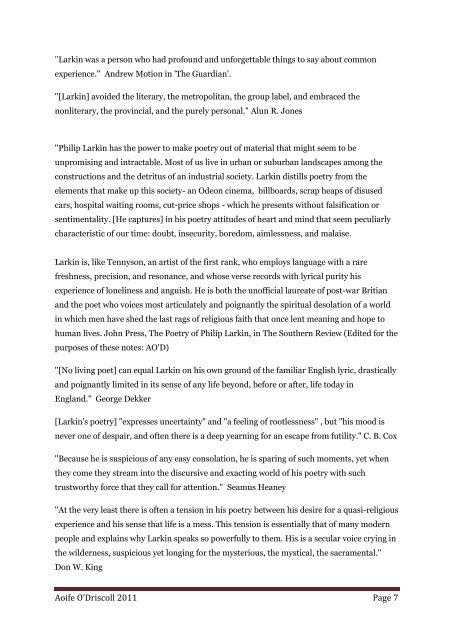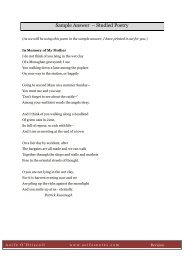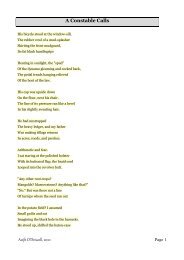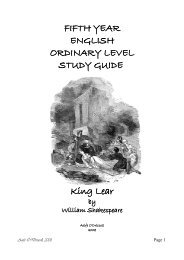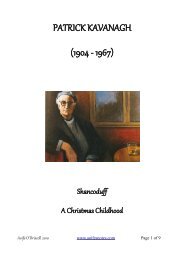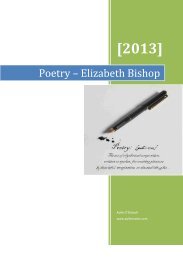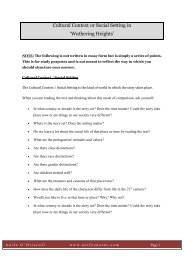Poetry - How to Write the Essay - Focus on Larkin - Aoife's Notes
Poetry - How to Write the Essay - Focus on Larkin - Aoife's Notes
Poetry - How to Write the Essay - Focus on Larkin - Aoife's Notes
Create successful ePaper yourself
Turn your PDF publications into a flip-book with our unique Google optimized e-Paper software.
''<strong>Larkin</strong> was a pers<strong>on</strong> who had profound and unforgettable things <str<strong>on</strong>g>to</str<strong>on</strong>g> say about comm<strong>on</strong><br />
experience.'' Andrew Moti<strong>on</strong> in 'The Guardian'.<br />
''[<strong>Larkin</strong>] avoided <str<strong>on</strong>g>the</str<strong>on</strong>g> literary, <str<strong>on</strong>g>the</str<strong>on</strong>g> metropolitan, <str<strong>on</strong>g>the</str<strong>on</strong>g> group label, and embraced <str<strong>on</strong>g>the</str<strong>on</strong>g><br />
n<strong>on</strong>literary, <str<strong>on</strong>g>the</str<strong>on</strong>g> provincial, and <str<strong>on</strong>g>the</str<strong>on</strong>g> purely pers<strong>on</strong>al." Alun R. J<strong>on</strong>es<br />
''Philip <strong>Larkin</strong> has <str<strong>on</strong>g>the</str<strong>on</strong>g> power <str<strong>on</strong>g>to</str<strong>on</strong>g> make poetry out of material that might seem <str<strong>on</strong>g>to</str<strong>on</strong>g> be<br />
unpromising and intractable. Most of us live in urban or suburban landscapes am<strong>on</strong>g <str<strong>on</strong>g>the</str<strong>on</strong>g><br />
c<strong>on</strong>structi<strong>on</strong>s and <str<strong>on</strong>g>the</str<strong>on</strong>g> detritus of an industrial society. <strong>Larkin</strong> distills poetry from <str<strong>on</strong>g>the</str<strong>on</strong>g><br />
elements that make up this society- an Ode<strong>on</strong> cinema, billboards, scrap heaps of disused<br />
cars, hospital waiting rooms, cut-price shops - which he presents without falsificati<strong>on</strong> or<br />
sentimentality. [He captures] in his poetry attitudes of heart and mind that seem peculiarly<br />
characteristic of our time: doubt, insecurity, boredom, aimlessness, and malaise.<br />
<strong>Larkin</strong> is, like Tennys<strong>on</strong>, an artist of <str<strong>on</strong>g>the</str<strong>on</strong>g> first rank, who employs language with a rare<br />
freshness, precisi<strong>on</strong>, and res<strong>on</strong>ance, and whose verse records with lyrical purity his<br />
experience of l<strong>on</strong>eliness and anguish. He is both <str<strong>on</strong>g>the</str<strong>on</strong>g> unofficial laureate of post-war Britian<br />
and <str<strong>on</strong>g>the</str<strong>on</strong>g> poet who voices most articulately and poignantly <str<strong>on</strong>g>the</str<strong>on</strong>g> spiritual desolati<strong>on</strong> of a world<br />
in which men have shed <str<strong>on</strong>g>the</str<strong>on</strong>g> last rags of religious faith that <strong>on</strong>ce lent meaning and hope <str<strong>on</strong>g>to</str<strong>on</strong>g><br />
human lives. John Press, The <str<strong>on</strong>g>Poetry</str<strong>on</strong>g> of Philip <strong>Larkin</strong>, in The Sou<str<strong>on</strong>g>the</str<strong>on</strong>g>rn Review (Edited for <str<strong>on</strong>g>the</str<strong>on</strong>g><br />
purposes of <str<strong>on</strong>g>the</str<strong>on</strong>g>se notes: AO'D)<br />
''[No living poet] can equal <strong>Larkin</strong> <strong>on</strong> his own ground of <str<strong>on</strong>g>the</str<strong>on</strong>g> familiar English lyric, drastically<br />
and poignantly limited in its sense of any life bey<strong>on</strong>d, before or after, life <str<strong>on</strong>g>to</str<strong>on</strong>g>day in<br />
England." George Dekker<br />
[<strong>Larkin</strong>'s poetry] "expresses uncertainty" and "a feeling of rootlessness" , but "his mood is<br />
never <strong>on</strong>e of despair, and often <str<strong>on</strong>g>the</str<strong>on</strong>g>re is a deep yearning for an escape from futility." C. B. Cox<br />
''Because he is suspicious of any easy c<strong>on</strong>solati<strong>on</strong>, he is sparing of such moments, yet when<br />
<str<strong>on</strong>g>the</str<strong>on</strong>g>y come <str<strong>on</strong>g>the</str<strong>on</strong>g>y stream in<str<strong>on</strong>g>to</str<strong>on</strong>g> <str<strong>on</strong>g>the</str<strong>on</strong>g> discursive and exacting world of his poetry with such<br />
trustworthy force that <str<strong>on</strong>g>the</str<strong>on</strong>g>y call for attenti<strong>on</strong>.'' Seamus Heaney<br />
''At <str<strong>on</strong>g>the</str<strong>on</strong>g> very least <str<strong>on</strong>g>the</str<strong>on</strong>g>re is often a tensi<strong>on</strong> in his poetry between his desire for a quasi-religious<br />
experience and his sense that life is a mess. This tensi<strong>on</strong> is essentially that of many modern<br />
people and explains why <strong>Larkin</strong> speaks so powerfully <str<strong>on</strong>g>to</str<strong>on</strong>g> <str<strong>on</strong>g>the</str<strong>on</strong>g>m. His is a secular voice crying in<br />
<str<strong>on</strong>g>the</str<strong>on</strong>g> wilderness, suspicious yet l<strong>on</strong>ging for <str<strong>on</strong>g>the</str<strong>on</strong>g> mysterious, <str<strong>on</strong>g>the</str<strong>on</strong>g> mystical, <str<strong>on</strong>g>the</str<strong>on</strong>g> sacramental.''<br />
D<strong>on</strong> W. King<br />
Aoife O’Driscoll 2011 Page 7


